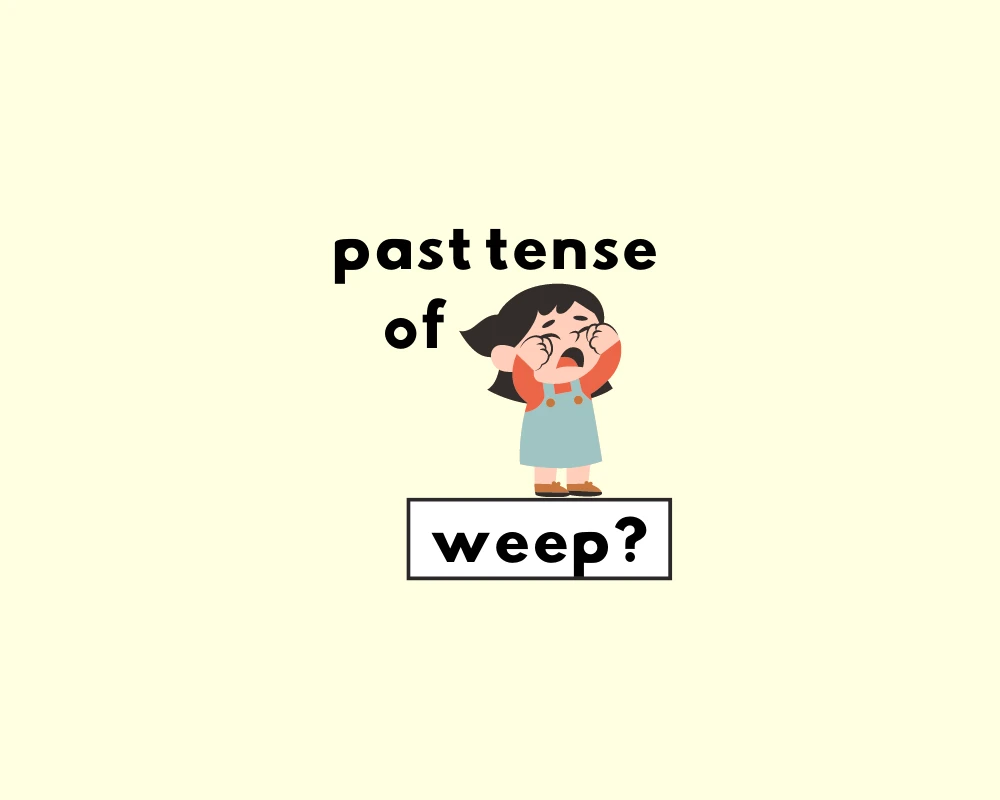What’s the past tense of “weep”?
To weep is something people do when they are sad. You might weep, for example, because you don’t know your proper English verb conjugations. Hopefully you haven’t wept over not knowing the past tense of weep. There’s no need—we’ve got your back. Let’s get into the lesson on the proper verb forms of the oh so sad verb and infinitive, to weep.
Usage Note
She wept silently during the entire memorial service.
He has wept tears of joy on numerous occasions.
Forms of the verb “weep”
In the dictionary, the action ‘to weep‘ is defined “to express deep sorrow for usually by shedding tears: weeping the sins and errors of his youth—Edward Gibbon”. To weep can also mean to drip, as in, “water was weeping through the basement wall”. Most often weep is used to mean cry or grieve, while shedding tears.
Verb forms—weep
| Present | Past | Future | |
|---|---|---|---|
| Simple | I weep or he/she weeps | I swept | I will sweep |
| Continuous | I am weeping | I was weeping | I will be weeping |
| Perfect | I have wept | I had wept | I will have wept |
| Perfect Continuous | I have been weeping | I had been weeping | I will have been weeping |
Past tense and past participle of “weep”
The verb weep is irregular since it doesn’t end in –ed in the past tense. Regular verbs in English use an -ed to show the past time, like walk, talk, laugh; and cry, all end in –ed in their past tense forms: walked, talked, laughed; and cried.
Verbs like weep, sweep, leap, are all irregular and belong to the category of verbs with two forms. To audibly hear the vowel patterns, say it out loud: weep/wept, sweep/swept, and leap/leapt. Since both the simple past and past participle forms of weep are wept, it can be tricky to know when to use the past tense vs. the past participle form. Let’s review the difference between them:
Simple past: I wept uncontrollably when I received the heartbreaking news.
Past perfect (participle form): The children, exhausted from crying, had wept themselves to sleep.
The simplest way to tell whether a sentence is in the past tense or is a past participle, look for any auxiliary verbs (or, a “helper verb”). The presence of a helper/auxiliary verb, such as have/has/had, is a key marker that the verb form is indeed a participle, and not the simple past tense.
Auxiliary verbs paired with the past form of a verb what creates other aspects of tense, like the past perfect tense and the passive voice in English. Participles not being complete tenses on their own require an auxiliary verb so the tense (points in time) are able to be determined. To help you remember the difference between a participle and a tense, repeat the following: a participle must participate with a partner!
Weep, wept in sentence examples
| Verb form | Example Sentences |
|---|---|
| Weep (weeps or weeping) |
I weep every time I watch a sad movie. I could hear them weeping during the film's most emotional scenes. Don't weep alligator tears. |
| Wept (past tenses and past participle) |
I wept wept uncontrollably when I received the heartbreaking news. We wept as we said our final goodbyes. |
| Wept |
I have wept many times over the pain of losing a loved one. We had wept all night long, overwhelmed by grief. |
Quotes from the media and literature
One willow over the river wept.
The eyes of Nero had to weep crocodile tears.
The skies ceased to weep, and the vail of clouds was withdrawn.
Stirring the loyalists up was like..playing with jelly that had been weeping for two years.
Other words for weep
- cry
- sob
- wail
- bawl
- lament
- shed tears
- snivel
- whimper
- moan
- break down
Phrases with “weep”
| Phrase | Meaning |
|---|---|
| read ’em and weep | an expression commonly used during card games where one person loses |
| weep buckets | to cry intensely for a while |
| laugh and the world laughs with you; weep and you weep alone | people will participate in your happiness but not in your sadness |
| to weep over (something or someone) | to cry over someone |
| enough to make the angels weep | said when something terrible or grievous occurs |
| to weep one’s heart out | to cry profusely over something |
| to weep for joy | said hyperbolically of one who is deemed so cold and indifferent as to be unable to cry tears |
Phrases with “weep”.
Origin of the verb/word, weep
Old English wepan “shed tears, cry; bewail, mourn over; complain” (class VII strong verb; past tense weop, past participle wopen), from Proto-Germanic wopjan
Worksheet: Weep, conjugations
Fill in the blank: She ______ silently during the entire memorial service.
Fill in the blank: He has ______ tears of joy on numerous occasions.
Fill in the blank: The children, exhausted from crying, had ______ themselves to sleep.
Fill in the blank: In the present tense, the old willow tree ______ over the pond.
Fill in the blank: They ______ with relief when they found out their loved one was safe.
FAQs
What is the past tense of weep?
+
Is “weeped” the correct past form?
+
What is the past participle of weep?
+
Simple past vs past participle wept?
+
Why isn’t weep’s past tense “weeped”?
+
Sources
-
Ricks, Christopher. "Tennyson, Alfred, first Baron Tennyson (1809–1892), poet." Oxford Dictionary of National Biography. May 25, 2006. Oxford University Press. Date of access 2 Sep. 2025,
Yash, D. "How to Use Weeped or Wept? (Irregular Verbs)." Grammarflex, Sep 15, 2025, https://grammarflex.com/weeped-or-wept/.








